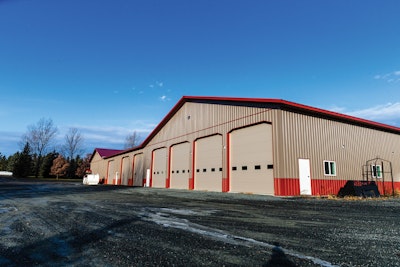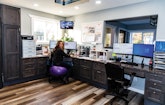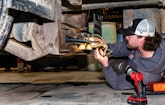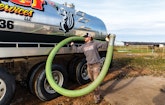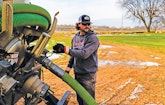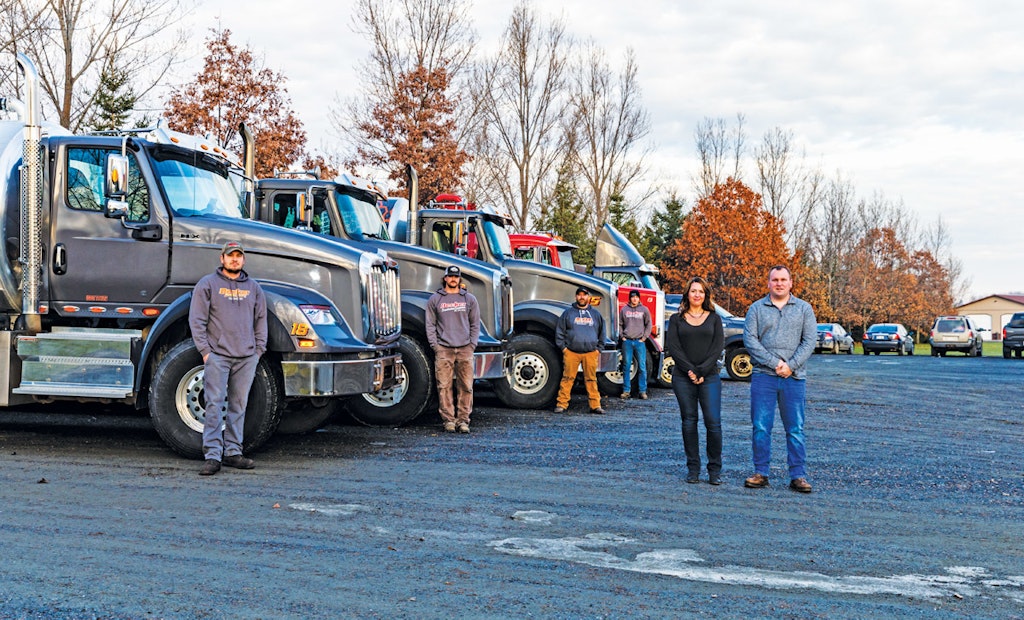
The Decker Sanitation Services crew includes, from left, Jordan Christianson, Ken Stickney, Shawn Tyznik, Caden Decker, and Brittany and Jamie Decker. Most of their fleet of vacuum trucks was built out by Imperial Industries.
During 2004, Jamie Decker worked mornings at his uncle’s farm, nights at a neighbor’s farm, bought nine portable restrooms and started a business — all while he was a junior in high school. His ambition never let up. The following year he graduated a semester early and added a night shift job at the sawmill.
But after five years he was given a push into full-time self-employment. “It was tough to give up the job because I made really good money,” he says. “But in 2009 my uncle approached me to buy his septic business. So I put my two weeks’ notice in at the sawmill and bought him out.” His uncle, David Erl, stayed on with the company. Other helpers along the way also propelled the business forward, the most significant of which was Decker’s wife, Brittany, who eventually joined the company. She brought business experience, automation and professionalization to the operation.
Today the Deckers operate Decker Sanitation Services out of a 10-bay shop and office in Dorchester, Wisconsin. In addition to Erl, their team includes Decker’s cousins Jordan Christianson and Caden Decker, Ken Stickney, Shawn Tyznik, summer helper Ashton Cliver and Tylor Duellman who works when needed. Their service territory covers a 60-mile radius for portable restroom work and a 45-mile radius for pumping services.
EARLY DAYS
It was Decker’s uncle who suggested he start a business. As a student, Decker was anxious to have spending money and his uncle knew from his septic customers there was a demand for portable restrooms. With family help, Decker bought seven standard and two wheelchair accessible units from Satellite Industries, a 2000 Chevy three-quarter-ton pickup with an Imperial Industries 200-gallon waste/100-gallon freshwater slide-in tank and Jurop pump, and a four-place snowmobile trailer for hauling units. His father Bill helped out when needed; his mother Diane handled phone calls, scheduling and invoicing; and his sister Kelly Decker-Gozdecki did year-end bookwork.
A big break for the company came in 2008 when Decker won a five-year contract to provide portable restrooms for Country & Rock Fest, one of the country’s largest music and camping events. To do so, he had to increase his inventory significantly, up to about 550 units, relying on his parents to co-sign a loan — which he found aggravating. “I was 22. You go around and ask the bank for that kind of money and they said they wouldn’t even normally look at a guy my age and single,” he says.
Then, with taking over his uncle’s septic business the following year, the business really started to grow.
TURNING POINT
A lot changed for the company around the mid-2010s. The Rock Fest contract was up and put out for bid again. Decker took some time to assess the pros and cons and came to a tough decision.
“It was something different, interesting,” he says, “But with the competition and bidding, I didn’t feel there was enough money to be made. It was a lot of work and we needed so much manpower. And trying to find help and do you trust them or not was hard.” He chose instead to downsize, sell off some equipment and add onto his shop.
Meanwhile, the septic business took a leap forward when Decker bought out two companies, hired another technician and eventually bought another vacuum truck.
And 2015 was the year Jamie and Brittany got married. Brittany also had her own business, a consignment shop. But she could see it would make more sense to join his company.
“We were missing so many phone calls while Jamie was out in the truck and I was at my shop,” she says. “So I decided to close the shop. People want to talk to somebody right away and be taken care of, they don’t want to leave a message. That really helped our business grow. We just took off like crazy from that point on.”
GOING DIGITAL
Brittany also could see it was time to computerize the company’s back-end processes. “When I met Jamie, everything was pen-and-paper and took forever,” she says. She knew digitizing would help the company as it grew. Brittany put the bookkeeping on QuickBooks and got a website going. They enlisted the help of an IT consultant at APB Solutions to design software to manage their small business.
“We started completely from scratch and built it to where everything is live feed for our guys in the truck,” Brittany says. “It does dispatch, billing, all my DNR (Wisconsin Department of Natural Resources) reports. The guys put the information in right away at the job and when I need to do my reports I just push a button and everything’s right there. That was huge.”
Recently added capabilities that allow people to pay their bill, order service or request a quote were immediately popular. In the future, they will add features for routing and printing receipts at the job site. Brittany admits it was a hard pill to swallow paying a couple thousand dollars to have the software built but says it has paid for itself. She says they especially notice the value on those rare occasions the internet is down and they have to revert to the old system. “It’s like, ‘How did you run a business like this?’”
PUMPING BREAKDOWN
Septic and holding tank pumping account for about 75% of the company’s work. Because of the heavy clay soils in their area, more people have holding tanks than septic systems. An average home with a 4,000-gallon holding tank needs pumping every month-and-a-half or two months, although that increased during COVID as people worked and attended school
from home. Septic systems are generally pumped every three years. A lot are older and for a while the counties were pushing people to update them. But they were lenient during the pandemic and just made sure systems were being maintained.
Most of the company’s vacuum trucks were built out by Imperial — a 1989 Freightliner with a 4,000-gallon steel tank, a 2007 Peterbilt with a 6,000-gallon steel tank, both with National Vacuum Equipment pumps, and 2019, 2020 and 2022 International HX620s with 6,000- or 6,200-gallon aluminum tanks and NVE 4310 blowers. They splurged on the last one and had a vinyl wrap put on it by PRO Designs. Decker says 95% of the waste goes to treatment plants but he rents land from relatives and has an AGCO 3,200-gallon injector truck for land application.
The company uses its septic trucks for a few non-septage customers. They used to have a number of mink farm clients until mink prices fell, but still have one and haul the washdown from the feed kitchen and storm sewer runoff. They also service grease traps for local restaurants and haul three loads a week of soy ink to a treatment facility for a packaging company that makes food-grade boxes.
RESTROOM WORK
On the portable restroom side, the company now has about 325 standard and 22 wheelchair-accessible units (PolyJohn, Satellite Industries, Sansom Industries), two Satellite ADA-compliant units and 20 Satellite hand-wash stations. Decker likes gray units to differentiate them from competitors and to accommodate customers who prefer units that don’t stand out visually. They use J&J Chemical deodorant products.
Their 2017 Ram 5500 with a 455-gallon waste/245-gallon freshwater aluminum sidewinder tank from Imperial and Masport HXL4 pump has a lift gate and room for six units. The 2021 International MV607 built out by Imperial has a three-compartment stainless steel flatbed tank (650 gallons waste, 275 gallons freshwater, 275 gallons saltwater brine), an NVE blower and can haul eight units.
About 30% of their restroom work is for events — Dorchester Days, Stanley Rodeo, Loyal Corn Fest, Colby Cheese Days. They also do a lot of private parties, especially since the pandemic. And people are starting to remodel their old barns and rent them out for weddings and parties. As a result, the company is now getting requests for restroom trailers, so that may be one of their next purchases.
Commercial customers include greenhouses, dairy farms and companies that want units at their loading docks so drivers don’t have to enter their buildings. A large Mennonite/Amish community in their county uses units at grocery and discount stores and for weddings and funerals.
BUILDING THE BUSINESS
The company has had a few employee glitches along the way. Raising wages really helped attract higher-quality workers and the Deckers now feel their current crew meshes well and everyone is self-motivated. They hold monthly meetings to touch base and talk about changes or issues. “And after work, sometimes we’ll have a beer or two and BS about stuff,” Decker says. “We’re pretty tight knit.”
Decker enjoys the freedom of being his own boss and is proud to say he still has his first customer, a grain farmer. Brittany adds she appreciates the flexibility of being able to attend their children’s events (Owen 10, Aubree 6, Ellie 4, Emmett 1). The downside, she says, is never getting away from the business. They’re often sneaking back into the office to get things done, or checking phones on the weekend for emergencies. But she says they both love it and can’t picture themselves doing anything else. “It just works for us. We’re still looking to expand here and there. We’ll roll with the punches, whatever comes our way.”
